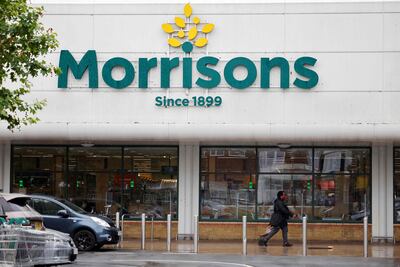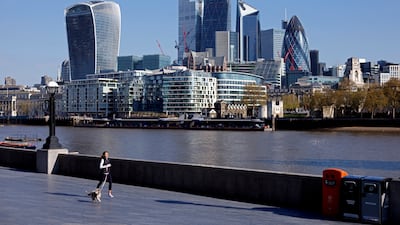Looking at UK Plc, you could be forgiven for wondering, what on earth is going on? On the one side, there are domestic company bosses galore moaning loudly about supply problems, staff shortages and predicting dire consequences. On the other, there is the almost daily occurrence of a foreign investor swooping into buy another British business.
It does not make sense. Yet it is true, the City, the part that advises on takeovers, has never been busier. In the somewhat dated parlance of my friends in the Square Mile, it has gone “gangbusters”. So far this year, we have seen 39 bids for British firms, all of them aimed at taking them private, and only two short of the total for the whole of 2020.
In the more polite words of Richard Buxton, a veteran fund manager of Jupiter Asset Management: “This year it’s all been unleashed.” Kwasi Kwarteng, the business secretary, prefers to put it differently, saying the unprecedented activity shows that Britain is “open for business”.
That’s as maybe, minister. But does it really explain a wide array of acquisitions, from Blackstone picking up St Modwen, the large property company and Signature Aviation, the private jet services operator, to KKR buying John Laing, the infrastructure firm? Sumo, a leading video games creator, has accepted a bid from Tencent of China, for $1.2 billion. There is a bidding war under way between US corporate and private equity giants for Morrisons supermarkets, which goes to auction next month.
There is a battle between foreigners taking place for Vectura, the inhaler-maker, and Mr Kwarteng has ordered an inquiry into the US purchase of defence contractor Ultra Electronics. Meanwhile, he is keeping an eye on the continuing scrap, again with national security implications, and also involving overseas investors, for major military engineer Meggitt. And the controversy surrounding the $40bn play from US tech giant Nvidia for semiconductor designer Arm Holdings rumbles on.
Even small companies are causing alarm. Officials have been asked to re-examine the acquisition of Newport Water Fab by a Chinese firm, and Perpetuus - a tiny maker of graphene (14 employees and sales last year of £479,000 ($661,353) - finds itself under review after a bid by a Chinese academic. Perpetuus may be small but the potential could be enormous. It manufactures graphene, hailed as the lightest and thinnest “supermaterial” known.

This is merely a selection, and there may be plenty more to come. According to markets analyst PitchBook, global investment companies are sitting on a whopping $1.3 trillion in cash, with much of that firepower likely to be directed at Britain.
In a sense, Mr Kwarteng is correct. Britain is a good place in which to do business. Our regulations are relatively relaxed, our legal system is world-renowned, education is strong, we speak English, the universal language, London is a great base in which to live and work, we are a user-friendly springboard to Europe. This is how Americans and overseas investors have long viewed the UK.
So, seen like that, this current frenzy is testament to the UK’s excellence and popularity. Mr Kwarteng and his colleagues should doubtless pat themselves on the back: while other places in the world are shunned, people with money want to be here.
There is, though, another reason for the country’s appeal. It is cheap. One top City fund manager told me he reckoned that the UK was offering a “25 per cent discount” versus comparable assets elsewhere. This is not so much a desire to buy British and never mind the cost, as bargain hunting on an epic scale. Britain, right now, is the equivalent of one giant showroom in which all the prices are slashed.
“The UK is cheap, and it has got broadly cheaper post-Covid and Brexit,” said Edward Bonham Carter, another leading fund manager.
Company valuations have been depressed by the pandemic. In the UK’s case, they were already brought lower by years of Brexit uncertainty. The pound sterling is also weaker for much the same reason. In the absence of a strong lead from the government as to the future direction and outlook for the economy, that’s where they have remained, there is no sign of any upturn.
To be fair to ministers, it is early to be champing at the bit for clear forecasts and figures on which to recalculate valuations — they have, after all, been blindsided by Covid, and its effects are still being felt and causing unpredictability. But it is certainly the case that the wave of foreign buyers is the result of Brexit — the UK is a nation with well-run companies that don’t know where they are heading thanks to leaving the EU, but what they have got is worth having.
This is definitely the attraction of Morrisons, for example, where the retail chain, which prides itself on growing and farming a substantial portion of its products to cut out the middleman, is sitting on assets more valuable than the stock market capitalisation attached to the overall holding company.
Britain has a whole buffet to choose from, of traditional, “legacy” enterprises in retailing, engineering, manufacturing, that to foreign would-be owners, should be more expensive to buy. By the same token, however, we are not pricing newer industries properly either. Our tech and data companies may attract what appear to be high offers, but they lag their global cousins.
Nick Train, who runs the £6.5bn Lindsell Train UK Equity fund, said UK digital and data companies appear cheap to foreigners, especially those from the US where tech prices are higher. “Investors, particularly US investors, understand the value that digital and data companies generate for their owners when they grow. Their capital intensity is low, meaning returns on capital are high and copious cash generated. I say particularly US investors, because companies with similar characteristics have been right at the forefront of the bull market there and very high valuations have been achieved.”
In some ways what is happening is what the City refers to as the “Wimbledon” effect, writ large. Each year, Britain hosts the best, most prestigious tennis tournament in the world and each year, a player from abroad wins it and worse, domestic players usually bow out in the early rounds. We do, though, know how to put on a cracking event. That was not true when Andy Murray was in his pomp, then there was a blip, but recently, normal service has been resumed.
Britain is “open for business” then, it is just a pity that the “sale” poster is so tightly glued to the shop window.


